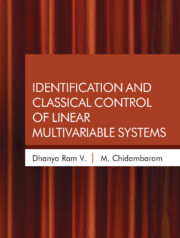Book contents
- Frontmatter
- Contents
- Preface
- Acknowledgements
- List of Abbreviations
- Notations
- 1 Models, Control Theory, and Examples
- 2 Identification and Control of SISO Systems
- 3 Introduction to Linear Multivariable Systems
- 4 CRC Method for Identifying TITO Systems
- 5 CRC Method for Identifying SISO Systems by CSOPTD Models
- 6 CRC Method for Identifying TITO Systems by CSOPTD Models
- 7 Identification of StableMIMO System by Optimization Method
- 8 Identification of Centralized ControlledMultivariable Systems
- 9 Identification of Multivariable SOPTD Models by Optimization Method
- 10 Identification of Unstable TITO Systems by Optimization Technique
- 11 Centralized PI Controllers Based on Steady State Gain Matrix
- 12 SSGM Identification and Control of Unstable Multivariable Systems
- 13 Control of Stable Non-square MIMO Systems
- 14 Control of Unstable Non-square Systems
- 15 Trends in Control ofMultivariable Systems
- Appendix A Identification of Unstable Second Order Transfer Function Model with a Zero by Optimization Method
- Appendix B For Chapter 3
- Appendix C For Chapter 7
- Bibliography
- Index
12 - SSGM Identification and Control of Unstable Multivariable Systems
Published online by Cambridge University Press: 31 July 2022
- Frontmatter
- Contents
- Preface
- Acknowledgements
- List of Abbreviations
- Notations
- 1 Models, Control Theory, and Examples
- 2 Identification and Control of SISO Systems
- 3 Introduction to Linear Multivariable Systems
- 4 CRC Method for Identifying TITO Systems
- 5 CRC Method for Identifying SISO Systems by CSOPTD Models
- 6 CRC Method for Identifying TITO Systems by CSOPTD Models
- 7 Identification of StableMIMO System by Optimization Method
- 8 Identification of Centralized ControlledMultivariable Systems
- 9 Identification of Multivariable SOPTD Models by Optimization Method
- 10 Identification of Unstable TITO Systems by Optimization Technique
- 11 Centralized PI Controllers Based on Steady State Gain Matrix
- 12 SSGM Identification and Control of Unstable Multivariable Systems
- 13 Control of Stable Non-square MIMO Systems
- 14 Control of Unstable Non-square Systems
- 15 Trends in Control ofMultivariable Systems
- Appendix A Identification of Unstable Second Order Transfer Function Model with a Zero by Optimization Method
- Appendix B For Chapter 3
- Appendix C For Chapter 7
- Bibliography
- Index
Summary
In this chapter, a method is presented to identify the Steady State Gain Matrix (SSGM) of an unstable multivariable system under closed loop control. Effects of disturbances and measurement noise on the identification of SSGM are also studied. Davison (1976) method is modified to design single-stage multivariable PI controllers using only the multivariable gain matrix of the system. Since the overshoots in the responses are larger, a two-stage P–PI control system is proposed. Based on the SSGM, a simple proportional controller matrix is designed by the modified Davison (1976) method to stabilize the system. Based on the gain matrix of the stabilized system, diagonal PI controllers are designed.
Introduction
SISO unstable systems with time delay are difficult to control compared to stable systems. The performance specifications like overshoot, settling time for such systems are larger for unstable systems than that of the stable systems (Padmasree and Chidambaram, 2006). Methods of designing PI/PID controllers for scalar unstable systems are given by pole placement method, synthesis method, IMC method, gain and phase margin method, and optimization method (Padmasree and Chidambaram, 2006). Conventional PI controllers give a relatively large overshoot for unstable systems. Jacob and Chidambaram (1996) have proposed a two-stage design of controllers for unstable SISO systems. First, the unstable system is stabilized by a simple proportional controller. For the stabilized system, a PI controller is designed. It is shown that an improved performance is obtained. Even for the stable multivariable systems, the method of designing controllers is complicated due to the interactions among the loops. Simplemethods of designing centralized PI controllers for stable systems are reviewed by Tanttu and Lieslehto (1991) and Katebi (2012).
Govindakannan and Chidambaram (1997) have applied the method of Tanttu and Lieslehto (1991) to unstable MIMO processes. Decentralized PI controllers are also designed by the detuning method proposed by Luyben and Luyben (1997). The decentralized PI controllers do not stabilize the system if the unstable pole is present in each of the transfer functions of the system. Only centralized PI controllers stabilize such systems. Papastathopoulo and Luyben (1990) have proposed a method of calculating the steady state gain of stable multivariable systems by introducing a step change in one set point at a time.
- Type
- Chapter
- Information
- Publisher: Cambridge University PressPrint publication year: 2023



